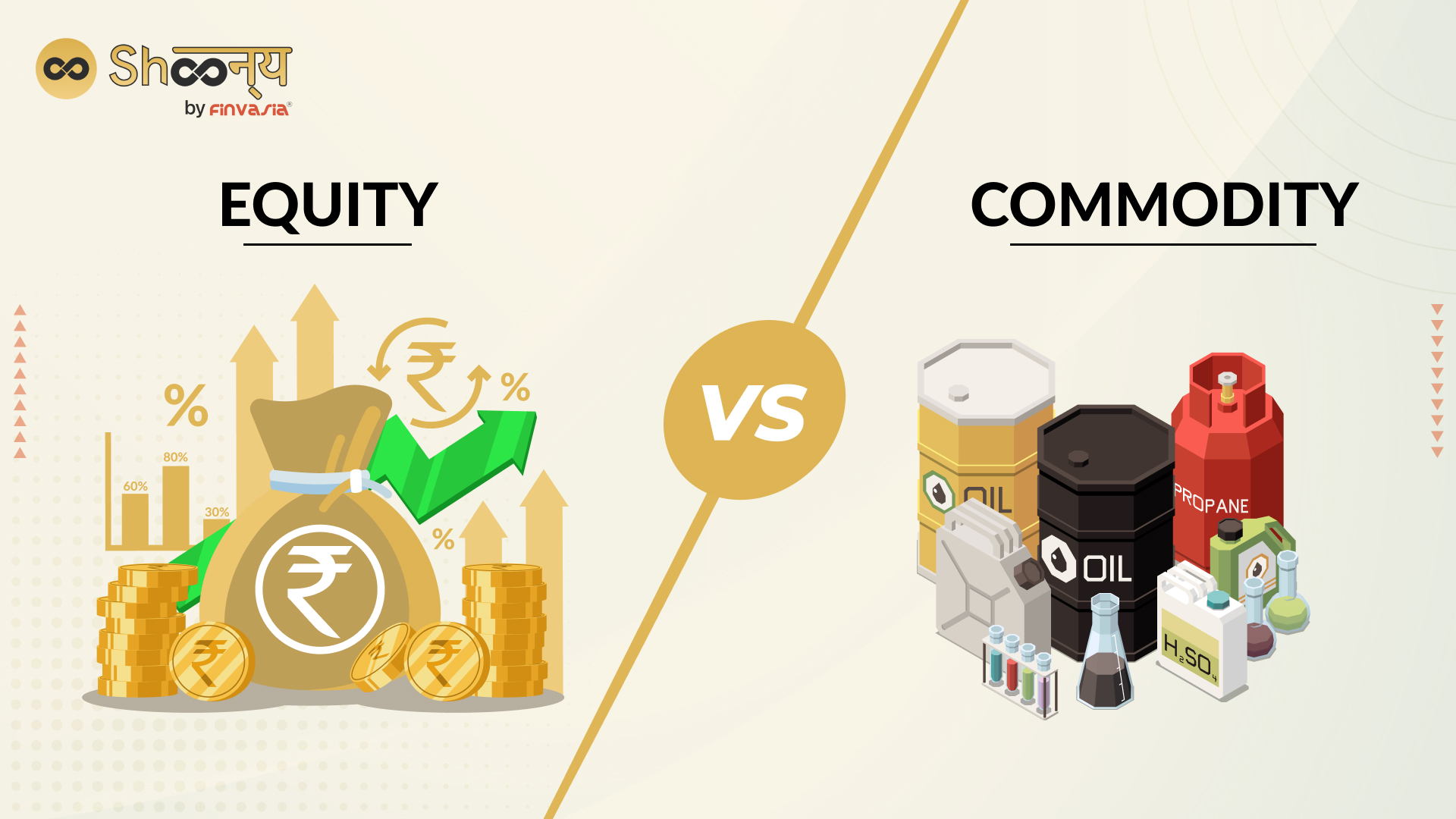Commodity vs. Equity Market: Unveiling the Distinctions

In today’s dynamic financial landscape, investors have a plethora of options to choose from when it comes to allocating their funds. Among the numerous choices available, two prominent options are commodity trading and equity trading. These investment avenues offer distinct features and opportunities, catering to diverse risk appetites and financial objectives. In this article, we’ll take a look at commodity vs. equity trading in the Indian context, shedding light on ownership, risk, dividends, trading hours, regulations, and more.
Ownership and Nature of Product
Equity Market: In the equity market, owning a share translates to owning a portion of the company itself. Shareholders have a stake in the company’s assets and earnings. Dividends are distributed to shareholders as a share of the company’s profits.
Commodity Market: In contrast, the commodity market deals with raw materials used in production or consumption. Commodity trading involves contracts rather than ownership, with value tied to the underlying asset’s performance.
Risk and Dividends
Equity Market: Generally considered less risky, equity investments allow shareholders to benefit from the company’s growth and receive dividends.
Commodity Market: Commodity trading carries higher risk, suitable for investors with a high-risk appetite. Unlike equity investments, there are no dividends in commodity trading.
Trading Hours and Regulations
Equity Market: Equity trading occurs during specific hours, providing ample time for investors to make informed decisions.
Commodity Market: Commodity trading operates round the clock, offering flexibility to investors. However, it is subject to stringent regulations by the Securities and Exchange Board of India (SEBI).
Trading Purpose and Duration
Equity Market: Investors often engage in equity trading to build long-term wealth. The focus is on identifying companies with growth potential.
Commodity Market: Commodity trading is favoured by producers seeking to hedge against price fluctuations. It’s more short-term and involves contracts with expiration dates.
Diversification and Period-End Valuation
Equity Market: Diversification in the equity market can be achieved by investing in various company shares. Periodic valuation is evaluated through profit and loss accounts.
Commodity Market: Commodities are inherently diversified due to the lack of direct correlation between different commodities. Period-end valuation is recorded through other comprehensive income on the expiration date.
Choosing Between Commodity and Equity Trading
Factors such as interest rates, macroeconomic conditions, and supply-demand dynamics impact both markets. Equity trading focuses on company performance, while commodity trading is more sensitive to supply and demand factors.
Investors must evaluate their risk tolerance and financial goals. Long-term objectives align with equity investments, while short-term goals find synergy with commodity trading.
Commodity vs. Stock Trading
- Nature of Assets:
- Commodity Trading: In commodity trading, investors buy and sell physical goods or raw materials such as gold, oil, wheat, coffee, etc. These commodities are standardized and traded on commodities exchanges.
- Stock Trading: Stock trading involves buying and selling shares or ownership stakes in publicly listed companies. When you buy a stock, you are essentially purchasing a portion of the company.
- Market Dynamics
- Commodity Trading: The commodity market is driven by supply and demand factors, global economic conditions, geopolitical events, and natural factors such as weather patterns. Prices of commodities can be highly volatile due to these factors.
- Stock Trading: Stock prices are influenced by the financial performance of the company, market sentiment, economic indicators, company news, and broader market trends. While stocks can also be volatile, they are influenced by a different set of factors compared to commodities.
- Liquidity
- Commodity Trading: Liquidity can vary depending on the specific commodity. Some commodities have active and liquid markets, while others may have lower trading volumes.
- Stock Trading: Stocks of well-established companies listed on major stock exchanges tend to have higher liquidity due to the large number of participants trading them.
- Physical vs. Ownership
- Commodity Trading: In commodity trading, investors can choose to take physical delivery of the commodity or settle in cash. However, most commodity traders focus on price movements rather than taking actual delivery.
- Stock Trading: Stock trading involves buying ownership shares of a company, but most individual investors do not take physical possession of shares. Ownership is recorded electronically through brokerage accounts.
- Market Hours
- Commodity Trading: Commodity markets often have specific trading hours that align with global trading sessions for different commodities. They may also have overnight trading sessions.
- Stock Trading: Stock markets also have specific trading hours that correspond to the business hours of the country’s financial markets. They typically do not operate 24/7.
- Regulations
- Commodity Trading: Commodity trading is regulated by commodity exchanges and relevant government agencies to ensure fair trading practices and prevent market manipulation.
- Stock Trading: Stock trading is regulated by securities and exchange commissions to ensure transparency, investor protection, and proper functioning of the capital markets.
In Conclusion
Equity and commodity trading offer distinctive advantages and cater to different investment strategies. Understanding the nuances of ownership, risk, dividends, and trading hours is essential for making informed investment decisions. Whether you’re drawn to equity for long-term growth or commodity for short-term hedging, a thorough grasp of these markets is paramount. By equipping yourself with knowledge, you can navigate the financial landscape and make choices that align with your financial aspirations.
______________________________________________________________________________________
Disclaimer: Investments in the securities market are subject to market risks; read all the related documents carefully before investing.








